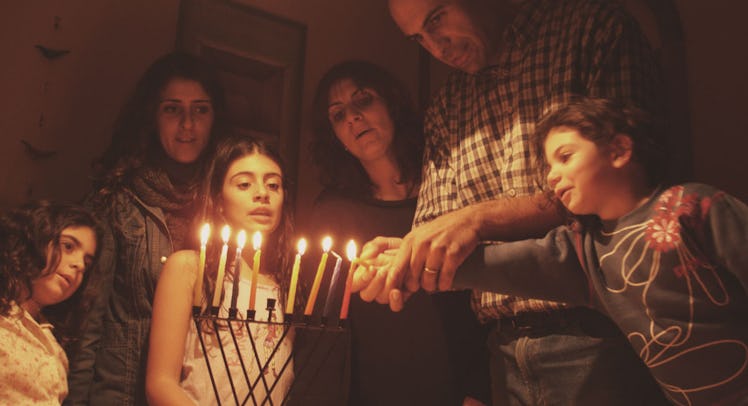Dear American Jews, Let’s Cool It With the Chanukah Presents
Ironically, Chanukah commemorates the Jewish people’s unwillingness to quell to societal pressures — for instance, the societal pressure to invest in Hallmark Holidays.

Adam Sandler trots out every year to remind the Jewish people that we shouldn’t feel bad about not celebrating Christmas because “instead of one day of presents, we have eight crazy nights.” That’s kind of true. Chanukah does boast eight nights. Most, however, are not crazy and the holiday offers little of the glamor that comes with tinseled trees, mall Santas, and gingerbread cookies. Aware of this, many Jewish parents try to upsell their kids on a downmarket holiday.
Sure, Christmas might be more appealing, but Jews get more presents.
But Chanukah, as those aware of the holiday’s history and significance well know, has nothing to do with presents. Chanukah actually commemorates the Jewish people’s unwillingness to quell to societal pressures, which makes it all the more ironic that, in common practice, the holiday has become a Christmas knockoff. By making the holiday more expensive one gift at a time, Jewish parents aren’t just celebrating consumerism — they’re cheapening the tradition.
Chanukah celebrates two events, an unlikely military victory and the miracle of a small jug of oil lasting eight days. In the year 174 BCE (500 years before the first Christmas was celebrated on December 25), the Seleucid king Antiochus IV ruled over a large chunk of the ancient world, including Israel. He suppressed the local cultures under his regime, pressuring them to conform to Syrian-Greek norms. For Israel, this involved installing idols in the Holy Temple and purging the land of Jewish customs. He was not well-liked. As the story goes, a ragtag band of guerrilla fighters from Judea repulsed several thousand Seleucid soldiers, restored the Temple, and lit a traditional candelabra, known as the menorah. They had only enough oil to keep it burning for one day but, miraculously, it burned for eight days — enough time for new oil to be produced. Which explains the modern menorah lightings, but not the presents.
Gifts didn’t become part of the Chanukah celebration until 19th-century American Jews sold out to holiday consumerism. According to historian Dianne Ashton of Rowan University, the entire notion of “Chanukah presents” can be traced back to two rabbis in Cincinnati who used the promise of presents to lure disengaged American kids into the synagogue. From there, it took off.
True, there exists a long-standing Chanukah custom for parents to give their children money (“Gelt” in Yiddish) and instruct them to donate it to charity or give it to their teachers as payment. But this was supposed to be a lesson in generosity or an exercise in teacher appreciation, which makes the modern practice of gift giving seem almost intentionally ironic. Gift giving (or, more to the point, gift receiving) is antithetical to the Chanukah tradition.
Worse, gift giving is a desperate and blatant grab at assimilation, a way of embracing American Christian culture (at least as American Jews imagine it) without doing something overtly Christian. And it’s symptomatic of a larger problem. Want proof? Scope the Chanukah stockings, Chanukah bushes, gingerbread menorahs, a mensches-on-a-bench (I kid you not, they ripped off Elf-on-Shelf!) marketed on Amazon. American Chanukah celebrations are often nothing less than blue-and-white Christmas parties, garnished with Hebrew letters.
If this wholesale adoption of local custom sounds familiar, it might be because you recognize it as exactly what Antiochus IV tried to accomplish two millennia ago. American Jews celebrate Chanukah — the holiday that commemorates our stubborn unwillingness to stop doing Jewish stuff and solemn determination not to assimilate — by cheerily appropriating Christmas. Why even bother celebrating Chanukah if (in spirit, at least) the Seleucids won?
But, alas, kids like presents (and eggnog, apparently). What’s an American Jewish father supposed to do when his children come home from school asking to deck the halls? That’s a tricky one. It’s hard to teach cultural pride while also teaching tolerance and appreciation for other cultures (doubly so when the other culture has superior holiday music). Nonetheless, experts agree that it is crucial that minority families teach ethnic pride and resist the urge to take the easy way out. “There are over 40 years of high-quality research that demonstrates being proud of your ethnic background is linked to higher self-esteem and better outcomes for young people of color,” Andrea Romero of the University of Arizona recently told Fatherly.
For American Jews, this means not trying to have our unleavened cake and eat it too. Instead of turning our ancient victory party into Christmas Lite, we should focus on making the holiday fun on its own terms. Light a giant menorah. Reclaim the dreidel. Fry up traditional latkes, which — bold claim — are better than gingerbread. In the immortal words of Grandpa Boris of The Rugrats (one of the first shows to feature a Chanukah Special): “The miracle is, these things have clogged our people’s arteries for 2,000 years. And yet, we survive!”
This year, let’s celebrate Chanukah on our own terms. We’ll survive.